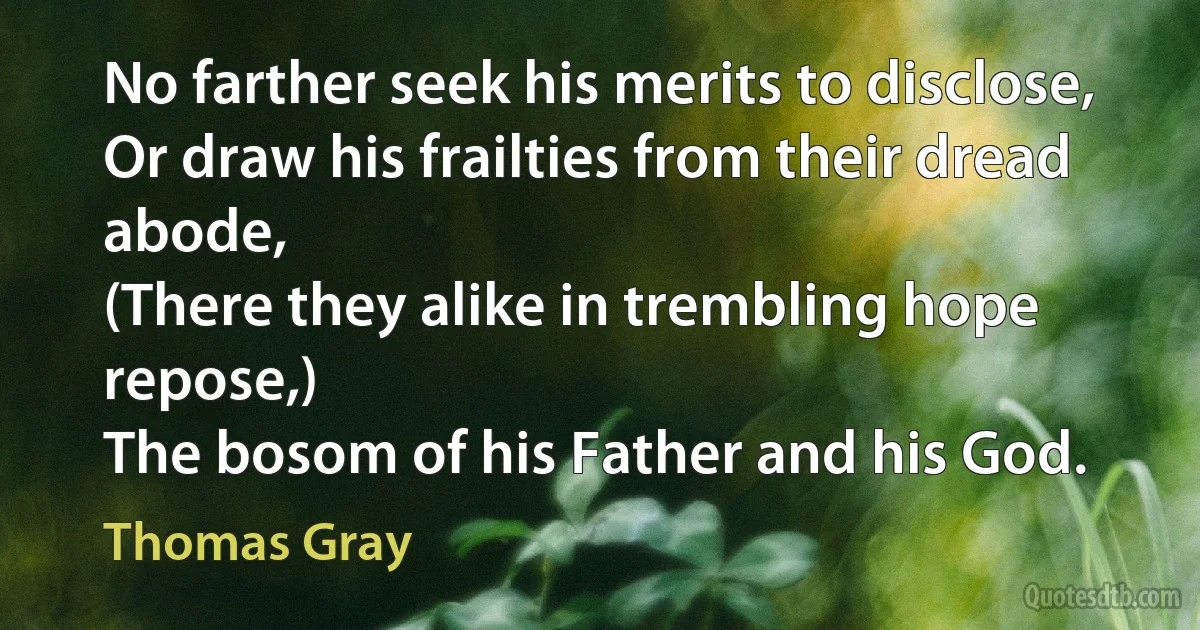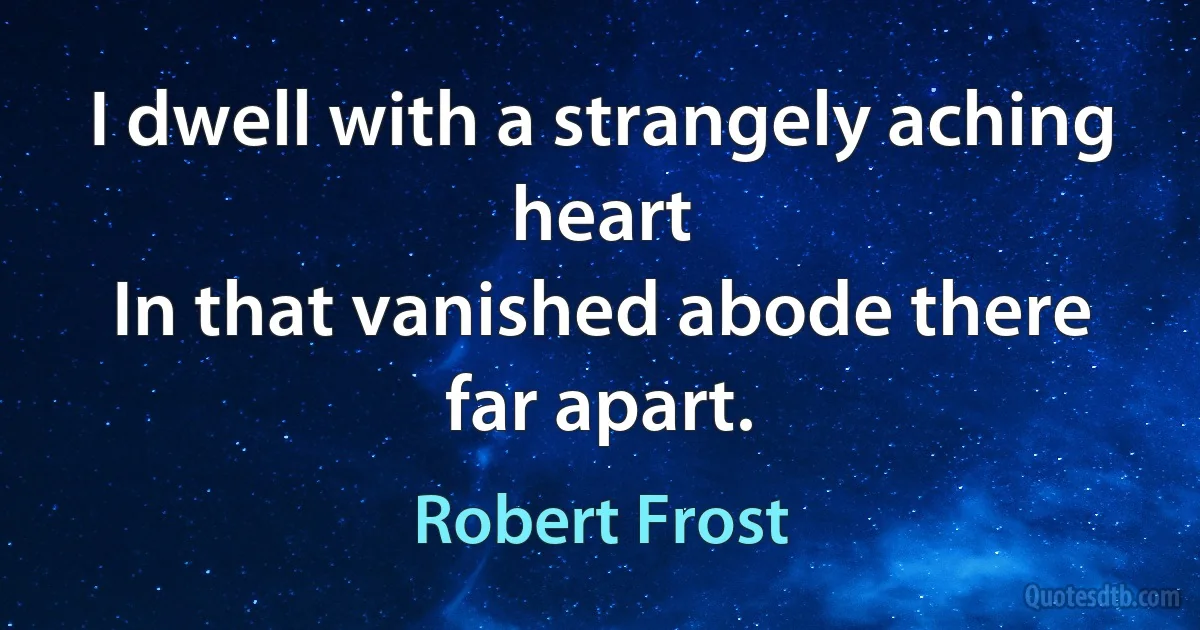Abode Quotes
A fearful thing stood at the cloister's end
And eyed him for a while, then 'gan to wend
Adown the cloisters, and began again
That rattling, and the moan like fiends in pain.
And as it came on towards him, with its teeth
The body of a slain goat did it tear,
The blood whereof in its hot jaws did seethe,
And on its tongue he saw the smoking hair;
Then his heart sank, and standing trembling there,
Throughout his mind wild thoughts and fearful ran:
"Some fiend she was," he said, "the bane of man."
Yet he abode her still, although his blood
Curdled within him: the thing dropped the goat,
And creeping on, came close to where he stood,
And raised its head to him and wrinkled throat.
Then he cried out and wildly at her smote,
Shutting his eyes, and turned and from the place
Ran swiftly, with a white and ghastly face.

William Morris
What an astounding thing is the voice! By what miracle is the hot magma of the earth transformed into that which we call speech? If out of clay such an abstract medium as words can be shaped what is to hinder us from leaving our bodies at will and taking up our abode on other planets or between the planets? What is to prevent us from rearranging all life, atomic, molecular, corporeal, stellar, diving? Who or what is powerful enough to eradicate this miraculous leaven which we bear within us like a seed and which, after we have embraced in our mind all the universe, is nothing more than a seed - since to say universe is as easy as to say seed, and we have yet to say greater things, things beyond saying, things limitless and inconceivable, things which no trick of language can encompass.

Henry Miller
Shivering in fever, weak, and parched to sand,
My ears, those entrances of word-dressed thoughts,
My pictured eyes, and my assuring touch,
Fell from me, and my body turned me forth
From its beloved abode: then I was dead;
And in my grave beside my corpse I sat,
In vain attempting to return.

Thomas Lovell Beddoes
For myself the delay may be compared with a reprieve; for in confidence I assure you, with the world it would obtain little credit that my movements to the chair of Government will be accompanied by feelings not unlike those of a culprit who is going to the place of his execution: so unwilling am I, in the evening of a life nearly consumed in public cares, to quit a peaceful abode for an Ocean of difficulties, without that competency of political skill, abilities and inclination which is necessary to manage the helm.

George Washington
Misery is a vacuum. A space without air, a suffocated dead place, the abode of the miserable. Misery is a tenement block, rooms like battery cages, sit over your own droppings, lie on your own filth. Misery is a no U-turns, no stopping road. Travel down it pushed by those behind, tripped by those in front. Travel down it at furious speed though the days are mummified in lead. It happens so fast once you get started, there's no anchor from the real world to slow you down, nothing to hold on to. Misery pulls away the brackets of life leaving you to free fall. Whatever your private hell, you'll find millions like it in Misery. This is the town where everyone's nightmares come true.

Jeanette Winterson
God brought to my mind that I should sin. And for pleasance that I had in beholding of Him, I attended not readily to that shewing; and our Lord full mercifully abode, and gave me grace to attend. And this shewing I took singularly to myself; but by all the gracious comfort that followeth, as ye shall see, I was learned to take it for all mine even-Christians: all in general and nothing in special: though our Lord shewed me that I should sin, by me alone is understood all.
And therein I conceived a soft dread. And to this our Lord answered: I keep thee full surely. This word was said with more love and secureness and spiritual keeping than I can or may tell.

Julian of Norwich
[A]ngels made no complaint about any of the creatures that were created during the six days of Creation, except about Man. This is because he was created in God's image and consists of Upper and Lower together. When the angels saw it, they were startled and bewildered. How would the pure, spiritual soul descend from its sublime degree, and come and dwell in the same abode with this filthy, beastly body? (...) The answer that came to them is is that there is already a tower filled abundantly, and empty of guests. To fill it with guests, we need the existence of this human, made of Upper and lower together (...) Know that this tower, filled abundantly, implies all the pleasure and the goodness for which He has created the creatures.

Yehuda Ashlag
According to Muslim cannon Law the world is divided into two camps, Dar-ul-Islam (abode of Islam) and Dar-ul-Harb (abode of war). A country is Dar-ul-Islam when it is ruled by Muslims. A country is Dar-ul-Harb when Muslims only reside in it but are not rulers of it. That being the Cannon Law of the Muslims, India cannot be the common motherland of the Hindus and the Musalmans-but it cannot be the land of the ‘ Hindus and Musalmans living as equals'. Further, it can be the land of the Musalmans only when it is governed by the Muslims. The moment the land become subject to the authority of a non-Muslims power, it ceases to be the land of the Muslims. Instead of being Dar-ul-Islam it becomes Dar-ul-Harb. (294)

Bhimrao Ramji Ambedkar
My estimate of American character has improved, contrary to my expectations, by this visit...I find myself in love with their intelligence, their sincerity, and the decorous self-respect that actuates all classes. The very genius of activity seems to have found its fit abode in the souls of this restless and energetic race. They have not, ‘tis true, the force of Englishmen in personal weight or strength, but they have compensated for this deficiency by quickening the momentum of their enterprises. All is in favour of celerity of action and the saving of time. Speed, speed, speed, is the motto that is stamped in the form of their ships and steamboats, in the breed of their horses, and the light construction of their wagons and carts: and in the ten thousand contrivances that are met with here, whether for the abridging of the labour of months or minutes, whether a high-pressure engine or a patent boot-jack. All is done in pursuit of one common object, the economy of time.

Richard Cobden



